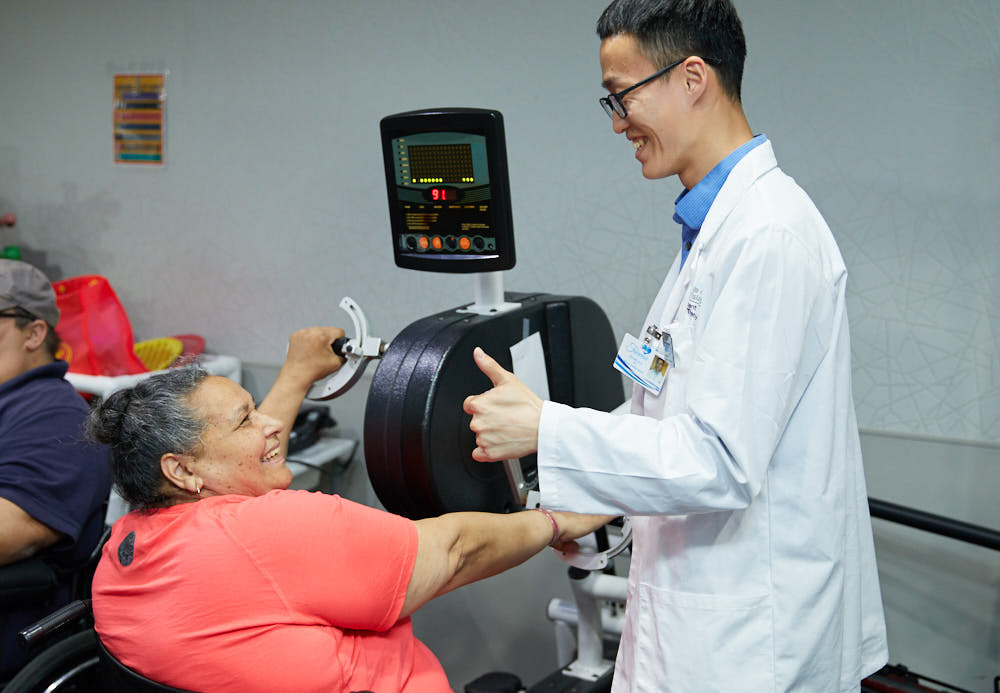Can Shingles Nerve Damage Be Permanent?
Herpes zoster, commonly called shingles, is the result of a reactivation of a dormant chickenpox virus. The symptoms vary in severity, including skin sensitivity, itching, tingling, and pain, before a rash or small blisters form. Though the virus should clear in 2 to 4 weeks, shingles nerve damage could lengthen recovery times. Some individuals suffer from pain or discomfort for months or years, while others have permanent issues.
Treatments for this common nerve infection may include massage, acupuncture, and medication. Though these options are helpful, physical therapy is one of the most effective treatments for shingles. A trained therapist may use therapeutic ultrasound and electrical stimulation and guide you through customized exercises to stretch and strengthen the body while reducing pain. Physical therapy is very helpful for pain also.

What Therapy Can Help Nerve Damage from Shingles?
Long-term nerve pain from shingles is called postherpetic neuralgia (PHN) and can last for months, years, or permanently. It affects the ability to perform daily activities and chores and makes sleep almost impossible. The affected area is sensitive to touch, even from clothing, and may feel itchy or numb.
Luckily, several therapies are available to help treat long-term symptoms and reduce discomfort and pain. Massage and acupuncture have some benefits, though no treatment works as well as physical therapy.
Physical therapy involves several aspects. Specialized exercises work the body, increasing flexibility and strength. Therapeutic ultrasound and electrical stimulation are beneficial since they relieve pain or discomfort. Heat or ice packs may also be used to minimize pain in the affected areas.
The main advantage of using physical therapy to treat nerve damage from the shingles virus is the minimal side effects. As long as you’re following the instructions of a medical professional, the condition shouldn’t worsen. Instead, you’ll notice reduced symptoms and better quality of life as your body heals.
What creams and vitamins can help?
Some topical medicines have shown effectiveness against shingles nerve pain. One option is capsaicin, which is produced from hot chili pepper seeds. It comes in a cream, lotion, or patch, numbing the skin for relief from discomfort. Lidocaine is another pain-relieving option, though it offers short-term relief while capsaicin is for extended relief.
Another possible treatment for shingles nerve damage is L-lysine. The amino acid is required to build protein and maintain the body’s healthy balance. Some evidence suggests lysine speeds up shingles recovery and may be effective at reducing long-term symptoms.
Another possible treatment option is the use of vitamins. When the body fights viral infections, vitamin C deficiencies occur. For those with shingles, the lack of vitamin C contributes to higher pain levels. Studies have shown that intravenous use of the vitamin reduces the symptoms of shingles and may prevent postherpetic neuralgia. It is also believed that vitamin C can reduce PHN pain for higher comfort levels.
Administering vitamin B12 to those with nerve damage from shingles has proven to be an effective pain reliever. This vitamin promotes nerve insulation and regeneration. It can be taken as a supplement or by ingesting certain mushrooms and other food in which B12 is naturally present.
Resources:
https://www.hopkinsmedicine.org/health/conditions-and-diseases/shingles
https://www.cdc.gov/shingles/about/complications.html
https://www.ncbi.nlm.nih.gov/pmc/articles/PMC9229281/
https://www.mayoclinic.org/drugs-supplements/capsaicin-topical-route/proper-use/drg-20062561?p=1
https://www.mayoclinic.org/diseases-conditions/postherpetic-neuralgia/diagnosis-treatment/drc-20376593
https://pubmed.ncbi.nlm.nih.gov/6423612/
https://pubmed.ncbi.nlm.nih.gov/30477853/
https://www.ncbi.nlm.nih.gov/pmc/articles/PMC3560828/
This article is for educational and informational purpose only and does not substitute for professional medical advice. For any questions about your own health condition, speak to a qualified physician or healthcare provider.







Leave A Comment